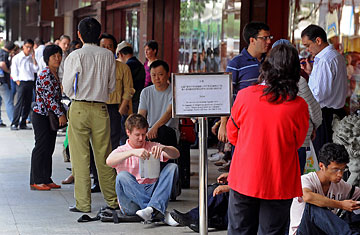
Applicants line up for visas to mainland China in Hong Kong on April 07
From the era of gunboat diplomacy to today's scan-and-go turnstiles, Hong Kong has always offered foreigners the most convenient passage to the Chinese mainland. Since Hong Kong's return to China from Britain in 1997, entry to the mainland has become even easier and faster—visas are processed with great speed and little hassle, making entry points into Shenzhen, the booming megalopolis adjacent to Hong Kong, among the busiest in the world. But all this has been upset in recent weeks: the Chinese government has mysteriously stopped issuing multiple-entry visas—an essential tool for Hong Kongs doing business with China—in a move that has sparked confusion and frustration.
Ask Juergen Weckherlin. The German garment businessman has worked in Hong Kong for nearly a decade; indeed, he is a permanent resident of the city. Over the years, Weckherlin has hopped into China more than 300 times to visit factories belonging to his company which are spread across four provinces. But now, after years of doing business in China, he finds himself stymied in his efforts to renew his visa at the mainlands issuing office in Hong Kong. "It's a slap in the face," he says, one that is being felt by hundreds, if not thousands, of other foreign businessmen living in Hong Kong. Instead, all that longstanding China travelers like Weckherlin are being granted are visas with paltry two-day durations and permits to visit only one city or province at a time. Even then, applicants are being forced to proffer both return tickets and hotel vouchers, a new requirement that makes planning for contingencies or traveling on the fly virtually impossible. Hong Kong's many foreign Chambers of Commerce have lodged complaints with the Chinese Foreign Ministry office in the city, but no clear explanation has yet to be given for the restrictions, or any word on how long they might last.
Beijing's security concerns over the Olympics, however, are probably behind the new measures. In Chungking Mansions, Hong Kong's famous warren of drug dens, second-hand cell phone shops and budget hostels popular with petty traders from overseas, dozens of stranded merchants mill around helplessly. Many hold passports from a list of 33 countries, mostly from South Asia and the Middle East, whose citizens are now barred from applying for any entry permit to China in Hong Kong—a sign, perhaps, of China's concern about a potential Muslim terror threat. Mohammed Salim, a Karachi-based trader who makes his living selling fake watches from China, says consular authorities in Pakistan instructed him to obtain his Chinese visa in Hong Kong. But after arriving he was told he would only get a visa for the mainland if he returned to his home country. "They do this just because of where I'm from," he says. "They don't care that I have a family to feed."
Mainland businesspeople are hurt, too. At Shenzhen's Luohu Commercial City—the mega mall that's a magnet for tourists seeking a bargain, and where Salim aimed to go—shopkeepers say fewer foreign customers are showing up. "Before, we were so busy. We're not selling much anymore; by 5 or 6 p.m., we're just playing cards," says Lin Ming, a clothing shop owner whose sales have dropped by 50% in the last month.
The inconvenience and lack of transparency have soured many who had bought into the China miracle. "As we are not allowed into China, why should we put our money there, writes Weckherlin on his blog. He insists he remains "for China," but some irate bloggers on his site have posted lengthy commentaries on the merits of quitting China for other emerging economies like Vietnam.
Most China analysts, though, expect these difficulties to disappear after the Olympics. "They're having a few jitters, but China isn't going to cut off its nose to spite its face," says Kent Kedl, a consultant at Technomic Asia, a Shanghai-based market strategy firm. Plans are already afoot to give Hong Kong permanent residents of any nationality visa-free access to the mainland within the next few years, the kind of privilege that millions of Asians who work in the West can only dream about. "Getting my Chinese staff to the U.S. is an absolute nightmare," says Kedl. "Let's have a bit of perspective."
With reporting by Ling Woo Liu
